|
|
|
Sort Order |
|
|
|
Items / Page
|
|
|
|
|
|
|
| Srl | Item |
| 1 |
ID:
160569
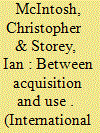

|
|
|
|
|
| Summary/Abstract |
Much of the contemporary literature on nuclear terrorism focuses on the question of whether a terrorist organization could acquire a nuclear weapon. This assumes that once a terrorist group acquires a weapon, they will, at some point, attempt to detonate it in an attack. This article calls that assumption into question by using a strategic perspective to examine the likely behavior of a nuclear-armed terrorist organization. We identify and assess the most likely options available and conclude that a nuclear terrorist attack is the least likely outcome—even for terrorist groups with nuclear capability. This results from three drawbacks of actually detonating a nuclear weapon: the costs associated with an attack, the benefits forfeited in terms of the options foreclosed by using the weapon, and the relative strategic value of alternative courses of action.
|
|
|
|
|
|
|
|
|
|
|
|
|
|
|
|
| 2 |
ID:
188925
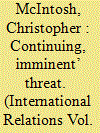

|
|
|
|
|
| Summary/Abstract |
For nearly two decades, the United States has chosen to narrate its response to terrorism through what Judith Butler refers to as the ‘frame of war’. Despite this, victory in that country’s longest war remains largely unimaginable. In some ways this is a problem of time – it is not that victory or an end to the conflict is literally unimaginable, it’s that from our political present, an end appears radically discontinuous. This article builds on recent work using temporality and the political present as a lens and conceptual framework to better understand how temporal assumptions and frames shape the practice of war and political violence. In this article, I show how time and timing play a significant role in justifying the violence of the war on terrorism and in making it intelligible as war. I examine the past three administrations and focus on three areas – the borders of wartime, temporal continuity, and the vision of a post-war future – to show important differences in administrative approaches. To more concretely understand the practice of political violence going forward, attention to the temporal dynamics of politics must be front and center, particularly one possessing ambivalent frames. Doing so reveals the implications these dynamics have for the conduct and permissibility of violence.
|
|
|
|
|
|
|
|
|
|
|
|
|
|
|
|
| 3 |
ID:
137153
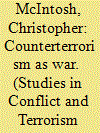

|
|
|
|
|
| Summary/Abstract |
The U.S. war on Al Qaeda is well into its second decade—why has this particular conflict been so difficult to end? This article argues it is not due to the strategic acumen of Al Qaeda, but because of the problems intrinsic to relying on war as the framework for U.S. counterterrorism policy. The normal means of ending wars are complicated with a terrorist enemy and at odds with strategies that have historically had success at the end stages of counterterror campaigns. Continuing along the current path risks an ongoing war the United States will likely neither win nor fully end.
|
|
|
|
|
|
|
|
|
|
|
|
|
|
|
|
| 4 |
ID:
126770
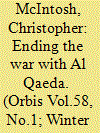

|
|
|
|
|
| Publication |
2013.
|
| Summary/Abstract |
As long as we conceive of the fight with al qaeda as a war, the fight will remain unwinnable and the goal of effective destruction will remain beyond our reach, according to the author. Historically speaking, modern wars require negotiated conclusions or the complete eradication of present and future threats. The former is politically impossible and the latter is historically unachievable.
|
|
|
|
|
|
|
|
|
|
|
|
|
|
|
|
| 5 |
ID:
188856
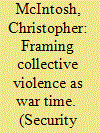

|
|
|
|
|
| Summary/Abstract |
Writing on the US war on terrorism, Judith Butler identified how discursive frames are produced and reproduced in ways that make certain forms of violence discernable as war. These frames that make war an intelligible form of political violence are not only spatial, but irreducibly temporal in nature. Their circulation–e.g., the framing of US counter-terror efforts as ‘war’ – enables some lives to be understood as grievable, while others lack political and normative value. These frames not only determine what is and is not a war, but whose deaths represent an unremarkable facet of peacetime. This article explores one instance where the circulation of these frames had the potential for rupture – the 2016 shooting at the Pulse nightclub in Orlando. First, it use the event’s liminal status as a ‘terrorist attack’ to make visible the frame(s) operating in the contemporary US political present to render certain acts of violence intelligible as political violence, terrorism, or war. Second, it explores the temporal dimension of these frames, showing how they function together within national security narratives to authorize certain forms of violence as exceptional. This article concludes by exploring the potential for ‘timing’ this violence differently as a means of political resistance.
|
|
|
|
|
|
|
|
|
|
|
|
|
|
|
|
| 6 |
ID:
168563


|
|
|
|
|
| Summary/Abstract |
This is a response to Mark Bell's “Defending the Acquisition-Use Presumption” by the authors of the original article “Between Acquisition and Use: Assessing the Likelihood of Nuclear Terrorism.”
|
|
|
|
|
|
|
|
|
|
|
|
|
|
|
|
|
|
|
|
|